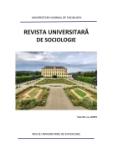LAND: A DETERMINING FACTOR FOR THE VILLAGE AS A HUMAN SETTLEMENT
LAND: A DETERMINING FACTOR FOR THE VILLAGE AS A HUMAN SETTLEMENT
Author(s): Maria CrăciunSubject(s): Agriculture, Rural and urban sociology, Migration Studies
Published by: Ediktura Beladi
Keywords: Romanian village; European village; land; human settlements; agriculture;
Summary/Abstract: According to the classical definitions, village is the oldest form of human settlement consisting of houses and groups of people who earn their living from an established social space. Besides the features of an urban, economic, social, ethnographic and historical nature, the village is characterized by a certain type of activities based on the exploitation of resources by inhabitants. The principle of causality, one of the principles of human settlements, puts into question the determining factors for the emergence, evolution and disappearance of human settlements, and the precautionary principle refers to the risk factors (natural or anthropic) that limit or stop the evolution of a settlement. This article presents a series of public data from the concrete reality that could be useful theoretically in order to establish a causality between the distance of the inhabitants on the earth, as their main resource of existence, and the disappearance of their forms of settlement, that is the disappearance of the determining factor becomes a risk factor.
Journal: Revista Universitară de Sociologie
- Issue Year: XV/2019
- Issue No: 2
- Page Range: 186-193
- Page Count: 8
- Language: English

